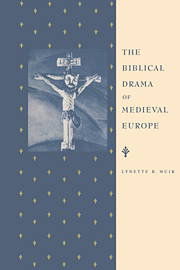Book contents
- Frontmatter
- Contents
- List of illustrations
- Preface
- Acknowledgements
- List of abbreviations
- Map 1 Medieval Europe showing locations of principal play-texts and records cited in this study
- Map 2 Enlargement of central area showing locations of liturgical and feast-day plays as defined in chapter 1
- Map 3 Enlargement of central area showing locations of civic and community plays as defined in chapter 2
- Introduction: Christian Europe and the Play of God
- PART ONE THE THEATRICAL COMMUNITY
- PART TWO THE THEATRICAL TEXT
- 4 Creation and Fall
- 5 The Covenant and the Kingdom
- 6 Prophets and precursors of Redemption
- 7 The Birth and childhood of Jesus
- 8 The public life of Jesus
- 9 The Passion and Resurrection
- 10 Pentecost to Judgement
- Conclusion: survival and revival
- Appendix: the liturgical context of the plays
- Notes
- Bibliographical index of plays
- Performance records and references
- General bibliography
- Index
6 - Prophets and precursors of Redemption
Published online by Cambridge University Press: 18 September 2009
- Frontmatter
- Contents
- List of illustrations
- Preface
- Acknowledgements
- List of abbreviations
- Map 1 Medieval Europe showing locations of principal play-texts and records cited in this study
- Map 2 Enlargement of central area showing locations of liturgical and feast-day plays as defined in chapter 1
- Map 3 Enlargement of central area showing locations of civic and community plays as defined in chapter 2
- Introduction: Christian Europe and the Play of God
- PART ONE THE THEATRICAL COMMUNITY
- PART TWO THE THEATRICAL TEXT
- 4 Creation and Fall
- 5 The Covenant and the Kingdom
- 6 Prophets and precursors of Redemption
- 7 The Birth and childhood of Jesus
- 8 The public life of Jesus
- 9 The Passion and Resurrection
- 10 Pentecost to Judgement
- Conclusion: survival and revival
- Appendix: the liturgical context of the plays
- Notes
- Bibliographical index of plays
- Performance records and references
- General bibliography
- Index
Summary
And beginning at Moses and all the prophets, he expounded to them in all the scriptures the things that were concerning him.
(Luke 24: 27)PROPHETS AND PROPHET PLAYS
There are frequent references in the New Testament to the fulfilling of prophecies. The liturgy, too, includes many texts from the prophetic books as lections in the Office, or adapted as the theme for an antiphon, responsory or other musical form, especially during Advent and the Christmas season.
It is not surprising, therefore, that a large number of the plays on the life of Christ, especially those which stage the Nativity, include a preliminary scene or scenes of such prophetic utterances which may include any or all of the sixteen biblical prophets, especially the four major ones: Isaiah, Jeremiah, Ezekiel and Daniel. Of the twelve minor prophets, Habakkuk is most commonly cited, though all appear in at least a few plays. In a large number of texts other biblical, historical or allegorical characters, especially Moses and David, figure among the speakers.
These prophetic scenes may be divided into two groups: in the first, a single prophet or a series of prophets come on stage and speak (or sing) the prophetic text; in the second, a group of prophets may be brought on stage together (usually in Limbo) and their prophecies are part of a dialogue.
- Type
- Chapter
- Information
- The Biblical Drama of Medieval Europe , pp. 83 - 97Publisher: Cambridge University PressPrint publication year: 1995



